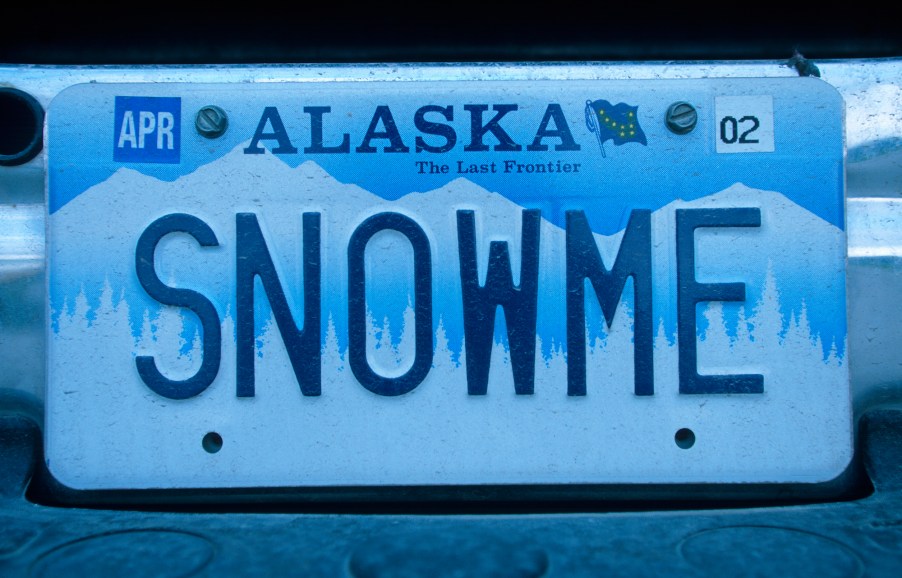
2 Nazi License Plates Got a State DMV in Trouble
Cruising down the highway in an expensive sports car is a surefire way to catch other drivers’ attention. But realistically, most people don’t have the bank account to support that type of self-expression. That’s where personalized license plates come in. For a small fee, drivers can select a unique combination of letters and numbers to display on their cars.
For the most part, vanity license plates make people laugh or bring a smile to their day. That is unless the message’s intention is malicious. Recently in Alaska, two license plates with Nazi references slipped past the DMV. That led to big trouble for everyone involved.
Regulations for personalized license plates in Alaska
Everyone has sat at a red light behind a car with a vanity plate and tried to decode the message. Sometimes it’s obvious right off the bat, but it usually takes a minute to figure it out.
Some people get creative, with the letters and numbers reflecting their personality. But all Department of Motor Vehicle (DMV) offices have strict guidelines regarding using symbols, emojis, and inappropriate messages on customized license plates.
The Alaska DMV clearly states it will not “issue personalized plates that display symbols in a combination that is demeaning towards a group of people, or that is otherwise a vulgar, violent, or criminal reference or term.”
If an inappropriate plate slips through, the Alaska DMV has the right to recall and invalidate it upon further investigation.
2 license plates bearing Nazi terms slipped through the system
In Anchorage, Alaska, a black Hummer H2’s driver decided to express himself with a personalized license plate reading, “3REICH,” Car and Driver reported. When other motorists saw it, they became outraged and wondered how this plate had made it past the DMV.
An investigation determined the vehicle’s driver had also previously owned a plate that read, “FUHRER.”
Kelly Tshibaka, the state commissioner overseeing the DMV, explained in an Alaska Department of Administration Facebook post that the “FUHRER” plate was issued more than 10 years ago. The DMV invalidated the vanity plate in October 2020 after receiving numerous complaints from the public. She explained a new plate reading, “3REICH,” was issued in its place the following month. After realizing the error, the DMV invalidated the new plate in January 2021, Alaska Public Media reported.
Alaska screens all personalized license plate requests before processing
Amid wide outrage, the state is looking into adjusting its electronic screening process, Anchorage Daily News reported.
Both of the Nazi-inspired license plates somehow evaded the computer-generated list of over 11,000 inappropriate terms. Commissioner Tshibaka said, “The DMV’s electronic screening list will undergo a thorough review and be updated to add additional vulgar, violent, criminal and demeaning terms, per the criteria in the Alaska Administrative Code.”
A select committee will also review all flagged requests to determine if the content is legal.
But this isn’t the first time the Alaska DMV has had problems with personalized plates. Anchorage Daily News reported in 2017, “There are 99,940 vehicles in Alaska with personalized plates, representing roughly 11 percent of the state’s registered vehicles.”
That year, the Alaska DMV declined close to 200 requests deemed offensive or inappropriate. Some of the absurd submissions included “KIDNPR,” “UR2BIG,” and “NO BS.”
Government official supports the offensive license plates
Strangely enough, Jamie Allard, an Anchorage Assembly member, defended the Nazi-themed license plates as “merely harmless foreign words,” Anchorage Daily News reported. She posted on her social media accounts that “progressives have put a spin on it and created their own definition.”
Rabbi Abram Goodstein replied to her comments in an open letter published in Anchorage Daily News. “We may have the right to say certain things,” he wrote, “but that does not mean we should say them, endorse them, or allow them to be said, without pointing out how harmful they can be.”


